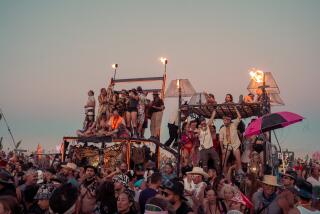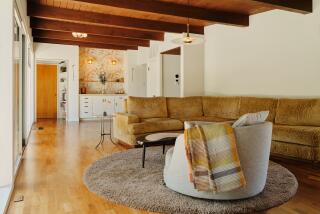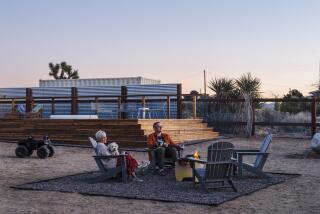Great Read: Art collective builds a dream house in Santa Fe with millions of dollars — and junk
Reporting From SANTA FE, N.M. — Something about the old sprinkler pipe, the way its black metal has corroded and blossomed in bright patches of rust, puts a smile on Matt King’s face.
“Perfectly aged,” he says. “Like gold to me.”
The 31-year-old artist thinks it will look great in his latest creation, a room he has transformed into a ghost town with scrap lumber and construction detritus. His portable band saw growls to life as he begins cutting.
“Turning your capitalistic trash into freedom of expression,” he says.
See more of our top stories on Facebook >>
King belongs to an eccentric group of painters and sculptors who have spent most of a decade working at the fringes of the conventional art world.
Calling themselves “Meow Wolf,” they have earned a reputation for using whatever materials they can scavenge to build fantastical exhibits that are part haunted house and part jungle gym — giant artwork that people can step inside.
These immersive shows — a psychedelic cave, a junk-filled dome — have grown progressively more elaborate. Now, after years of surviving on shoestring budgets, Meow Wolf has persuaded investors to pour millions of dollars into something even bigger.
The Santa Fe group has procured an abandoned bowling alley in a struggling part of town to house a massive, permanent exhibit. King and his friends call it a dream come true, but it comes at a price.
The project has thrust them into an unfamiliar world of business meetings and building codes. As King works on his assigned space at the back of the old Silva Lanes, a colleague approaches with clipboard in hand.
Sean Di Ianni, an abstract landscape painter, has assumed the role of project manager and, as such, worries about jagged edges on all that pipe.
“People make this beautiful, amazing stuff,” Di Ianni says. “Then I have to come in and say, ‘Some kid is going to hurt himself on that.’”
::
The first thing visitors to “House of Eternal Return” will encounter is a full-scale Victorian mansion. It seems normal enough.
But step into the living room and you discover the fireplace is a portal leading to a cavern of glowing crystals. Climb through the refrigerator and you end up in a futuristic travel agency staffed by a holographic extraterrestrial.
“We got the idea on a road trip to New Orleans,” says Vince Kadlubek, one of Meow Wolf’s founders. “We thought it might be cool if we built a house with secret passageways to other worlds.”
The group developed a theme around a fictional Alabama family that once lived in the mansion. Artifacts the Seligs left behind — clothing, journals, a grocery list on that refrigerator door — offer clues to their innermost thoughts, a psychological landscape that inspires the surrounding worlds.
Out back is a grove of twisted steel trees and a narrow space whose colors and shapes match an abstract painting inside the home. Past the cave, the family’s aquarium is re-created in a tall corridor flooded with ultraviolet light instead of water.
Meow Wolf needed help filling 20,000 square feet with such outlandish visuals. Dozens of outside artists were brought aboard, assigned specific areas and told to create something, anything, that related to the story line.
If the resulting artwork had no connection to the Seligs, the group went back and tweaked the narrative to create a link.
“I was getting kind of bored with the old dynamics of the art world,” said Nick Toll, a painter who came from Denver to create the abstract room. “This is kind of exciting because there is a whole other set of rules.”
::
Scuttling around on a perch in the steel forest, the woman who calls herself “Culture Witch” is fussing with a tent-size geodesic dome, a sort of treehouse constructed from two-by-fours. The surrounding bustle — hammers banging, sanders buzzing — rankles her.
“I’m used to working in my studio alone,” she says.
I’m a science-fiction and fantasy guy. A house lost in time and space ... that’s something I couldn’t resist.
— George R.R. Martin, whose books inspired the cable TV hit “Game of Thrones”
With tattooed arms and a silver hard hat pulled down over short hair, Erika Wanenmacher exudes an air of toughness. The 60-year-old usually makes ethereal paintings and objects crafted from string, fabric and wire.
For this project, she plans to enclose her dome and paint the interior pitch-black with large glass eyeballs mounted in the walls. Normally, she would use cheap Christmas lights to make them glow, but Meow Wolf’s investor money has paid for a crew of technical experts, many of them recruited from a nearby university. They have designed dozens of special effects for the artists.
Wanenmacher wants miniature LED lights and electronic sensors that trigger animal sounds from hidden speakers whenever someone enters her dome.
“This is seriously the trippiest thing I’ve ever done,” she says.
It takes much of the afternoon to mount the lights on metal strips that attach to the dome’s frame. A tech worker stops by to check on her progress.
“The lights were totally dangling,” Chris Clavio says later. “That wasn’t going to work.”
Clavio is the sort of person who gets excited about low-voltage infrastructure, showing off an electrical distribution box where all the cables are joined by identically colored connectors.
Not that he expects painters and sculptors to understand the technology; he simply wants them to know he is every bit as passionate about wiring as they are about color and composition. And that means Wanenmacher’s hidden lights must be more cleanly mounted.
“Even the stuff that nobody sees, it has to be beautiful,” he says. “It has to be incredible.”
::
The original Meow Wolf members started as friends at a Santa Fe teen center. After a few years, they shifted to a nearby warehouse, working day jobs to cover rent and making art at night. They named themselves by drawing random words from a hat.
In those early days, King and another member, Quinn Tincher, started messing around with papier-mache, fixing sculptures to the walls and ceiling.
“It came from having our own space that we were paying for and no one could tell us what to do,” King recalls.
Thus began a series of collaborative installations that included a misty shrine and a chaotic shantytown.
In 2011, the Center for Contemporary Arts in Santa Fe invited Meow Wolf to build “The Due Return,” a 70-foot wooden ship designed to look as if it were retrofitted for space travel, its quarters filled with alien fungi and sci-fi gadgetry. The three-month show drew 25,000 visitors.
“That’s when we really knew we had an audience,” Kadlubek says. “The seed was planted.”
Kadlubek, now 33, began contacting potential investors. George R.R. Martin, a local author whose books had inspired the cable television hit “Game of Thrones,” was hesitant until he toured the empty bowling alley and heard the “Eternal Return” story.
“I’m a science-fiction and fantasy guy,” Martin says. “A house lost in time and space … that’s something I couldn’t resist.”
::
Electronic music plays fast and tinny from a boombox as colored lights swirl across the ceiling. Benji Geary is running the show, urging everyone to join in.
Meow Wolf’s “spiritual mascot” starts a call-and-response rap. In Chinese.
His compatriots, scattered across dilapidated couches and plastic chairs, respond by shouting a phonetic phrase he has taught them. The staff meeting has officially begun.
“Ten weeks till we open,” Kadlubek says when the music stops. “The final phase.”
Meow Wolf gatherings used to be dominated by philosophical debates about art and cultural identity. Now, with 45 core members paid full-time wages, the conversations include practical matters.
A new investor has added $150,000 to the $3.5 million that Martin supplied, so there will be enough money to finish by mid-March. Di Ianni, the 31-year-old project manager, reminds everyone to wear safety harnesses on scaffolds and take care when cutting or nailing into walls.
It seems King mistakenly fired a nail gun through concealed electrical conduit the day before.
This bit of news starts people cracking jokes, disrupting the serious mood. Kadlubek doesn’t mind; fun is one of the talking points on his agenda.
After a year of contracts and blueprints, he says, “it’s time we start shifting from left brain to right brain.”
That means working late at night, obsessing over form and texture, like the old days. Which sounds good to King.
His assigned area, with walls made to look like storefronts in a ghost town, is inspired by a family member’s daydream about a place where anarchist artists might live. He cannot resist using jagged pieces of the sprinkler pipe along a staircase, but mollifies Di Ianni by adding strategically placed oil drums to keep visitors at a safe distance.
“Things have changed,” King says, pausing briefly before wondering, “How do we do this and remain true to ourselves?”
The answer will have to wait. For now, he has work to do, his arc welder crackling and spitting bright blue sparks.
Twitter: @LATimesWharton
More to Read
Sign up for Essential California
The most important California stories and recommendations in your inbox every morning.
You may occasionally receive promotional content from the Los Angeles Times.











